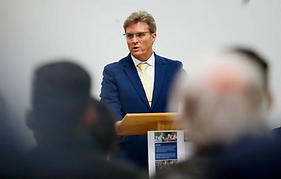Carney’s Cabinet: Fresh Start or Trudeau 2.0? | Inside Politics
This week’s episode of Inside Politics with Kevin Klein featured a pointed and in-depth conversation about Prime Minister Mark Carney’s new federal cabinet — a lineup that has sparked strong reactions across the country, particularly in the West.
Klein was joined by political scientist and Winnipeg Sun contributor Royce Koop for a no-spin discussion that raised questions about executive leadership, patronage politics, and national unity. While both agreed Carney deserves time to prove himself, they voiced concern over what they see as early missteps.
“I really wanted to see that senior executive in him,” Klein said, referencing Carney’s campaign image as a sharp, results-oriented leader. “Instead, I saw a lot of recycled faces and political appointments that looked more like payback than a fresh start.”
Koop echoed the concern. “Half the cabinet is made up of Trudeau-era ministers,” he said. “People who were directly tied to some of the biggest policy failures in recent memory. If this was Carney’s chance to signal a break from the past, it didn’t come through in these appointments.”
Both pointed to examples: Sean Fraser, once at the centre of the immigration and housing files, is now Justice Minister. Former Vancouver Mayor Gregor Robertson, now Housing Minister, led during British Columbia’s most intense housing crisis. And Evan Solomon, a former broadcaster with no clear public record in artificial intelligence, was named Minister of AI.
“Where’s the accountability? What’s the mandate?” Klein asked. “If you can’t measure someone’s performance, you can’t manage it. That’s business 101.”
The pair also raised regional concerns. For the first time in years, Winnipeg has no cabinet representation. Cities like Calgary, Regina, and Saskatoon were also left out — while Brampton, Ontario, landed three ministers.
“This is why Western Canadians talk about separation,” Klein said. “There’s no voice at the table for us. One city in Ontario gets three cabinet seats and the entire Prairies get one?”
Koop agreed and warned that the imbalance risks fueling national division. “These aren’t unreasonable concerns,” he said. “Resource development, trade, affordability — the federal government is supposed to help solve these national issues, not deepen the divide.”
Despite the criticism, both Klein and Koop noted a few promising moves. Anita Anand, now Minister of Foreign Affairs, was called a “serious upgrade.” And Tim Hodgson, a newcomer with a strong financial background, was praised as a potentially strong Natural Resources Minister.
But they emphasized urgency.
“People who were struggling a year ago are still struggling today — and in many cases, it’s worse,” Koop said. “Cost of living, housing, trade, and the economy. These issues haven’t been resolved, and this cabinet has to act fast.”
Klein wrapped the episode by calling on the Prime Minister to offer weekly updates on trade talks with the U.S., and to assign a dedicated cabinet member to handle Canada-U.S. relations. He warned against repeating the Trudeau-era habit of slow communication and vague promises.
“Canadians don’t want slogans,” Klein said. “They want straight answers and real solutions. Carney said he was different. Now he has to show us how.”






























